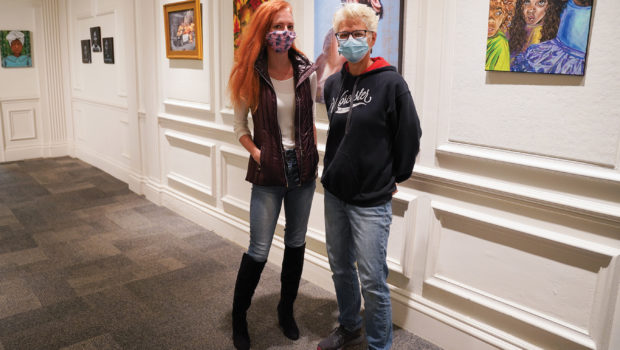By Aviva Luttrell, Correspondent
The healing power of art is well documented, with studies showing numerous benefits for people dealing with issues ranging from anxiety to physical illness, so when UMass Memorial Health Care was looking to invest in projects aimed at improving the welfare of the community, it found a natural partnership in Creative Hub Worcester.
UMass Memorial recently granted the nonprofit arts and community development organization a $500,000 investment loan to help transform Worcester’s former Ionic Avenue Boys Club into a center for creative and cultural programming. The $14 million project, led by Creative Hub co-founders Laura Marotta and Stacy Lord, will convert the historic 1914 building into a dynamic ecosystem of creative offices, a visual arts maker space, classroom space with educational programming for underserved youth, an installation art gallery, private studio rentals, and a rooftop event venue.
“We want to provide residents with a place to commune, collaborate and network,” Lord said. “We’ve been invested in this neighborhood since we acquired the building four years ago.”
The former Boys Club, once a safe place for hundreds of children of immigrant families who came to the area during the manufacturing boom, has sat vacant for more than a decade. Marotta and Lord hope to bring the space full circle, beginning construction on the new Creative Hub Community Arts Center next year with a 2022 opening date.
“Laura and Stacy have a wonderful concept in mind. It’s a great building that has a long history of community engagement and collaboration,” UMass Memorial Community Hospitals President and Chief Administrative Officer Doug Brown said. “We know that art is a great way of transforming communities. We’ve seen it done again and again.”
Creative Hub’s project is among several community-based initiatives being funded by UMass Memorial. As part of its Anchor Mission, the health care system is redirecting 1 percent of its long-term investment portfolio – or $4 million – to invest in local initiatives aimed at addressing social disadvantage and pervasive inequality.
The former Boys Club sits at the entrance to Worcester’s Main South neighborhood and adjacent to Kelley Square, where Brown said the average life expectancy is just 73 years – lower than that of many developing countries. In the Kelley Square area, one-third of the population lives below the poverty line, 60 percent are on Medicare, and many do not have access to a vehicle, Brown said.
Just two miles away in Worcester’s west side, the average life expectancy jumps to 84 years.
“That’s unacceptable to us – an organization that’s committed to improving the health of our community,” Brown said. “If we take good care of people when they come inside our organization and send them back out and don’t address these social determinants of health, then we’re not living up to our mission.”
Creative Hub already provides programming at its nearby Youth Arts Space on Main Street, including workshops and childcare programs. The nonprofit also operates an art gallery at The Aurora building across the street.
“We’re really investing in the residents who live here and trying to make their lives better,” Marotta said. “Look at this neighborhood and you’ll see the ridiculous amount of talent we need to celebrate.”
UMass Memorial’s Investment Committee first became aware of Creative Hub’s work through a Leadership Worcester connection. Marotta completed the 10-week, Chamber-led program, which explores different themes relevant to the Worcester community through hands-on leadership experiences, in 2018. The following year, she gave a tour of the former Boys Club to the Leadership Worcester Class, which included Kathryn Behan, director of clinical affiliations at UMass Memorial.
Impressed by Creative Hub’s work and vision, Behan – who chairs the Investment Committee – brought the project to her organization. After spending months putting together an in-depth application, Creative Hub was awarded a seven-year, $500,000 investment loan.
“The Leadership Worcester connection was awesome. The investment probably would not have happened without that,” Marotta said.
Brown said the Creative Hub Community Arts Center will provide a pivotal connection between downtown and the Main South neighborhood, and will provide jobs and empowering programming for residents. As part of the partnership, Creative Hub will also host programming with UMass Memorial.
“They will bring patients to our space or we will go to their space and teach classes,” Marotta said. “They could also have their mobile medical van pull up and offer their services to the people in this neighborhood – it’s endless possibilities.”
Creative Hub, along with the Arts and Business Council, has already secured $4.5 million in tax credits, $1.1 million in financing, and over $1 million in fundraising for the former Boys Club renovation. The organization hopes to raise another $400,000 from businesses and others in the community through donations and naming opportunities.
The Guild of St. Agnes, which will rent space in the building to provide subsidized child care for 88 toddlers and preschoolers, is also bringing nearly $3 million to the project.






